is a great way to spend time with friends and family. You get to relax, enjoy nature, and be free from the stresses of daily life. However, can also bring about its own set of challenges. One such challenge is keeping animals away from your . Here are some tips on how you can keep wild animals such as bears, rodents, and raccoons away so that you can have a safe and enjoyable !
Before you head out on your adventure, make sure you know what types of animals you’re likely to encounter so you can be prepared by knowing how to keep animals away from your campsite. If you’re in states with bears or cougars (aka mountain lions, pumas, panthers) you’ll want to be prepared with some extra gear. But no matter where you’re , you’re likely to encounter a variety of wild animals that you should be prepared for-including raccoons, opossums, snakes, rats, chipmunks, squirrels, and other creatures.
Keep in mind that when you’re out in nature, you’re visiting the local ‘s home. There’s no humane way to effectively keep 100% of animals out of your camp, but there are precautions you can take to help reduce the chances.
Contents
Check Your Before You Head Out
While a doesn’t offer any real protection from a (a bit of fabric isn’t exactly going to stop a ), it doesn’t hurt to give your a once-over before and after your trips to ensure there aren’t any holes or tears that little critters can easily crawl through. A determined can chew through fabrics if they want, but ensuring your is fully intact makes it a bit less inviting for roaming animals.
Choose Your Wisely
When you’re staking out the perfect spot, there’s a few tips you can keep in mind to help limit your chances of encountering local .
Stay Away from Water Sources
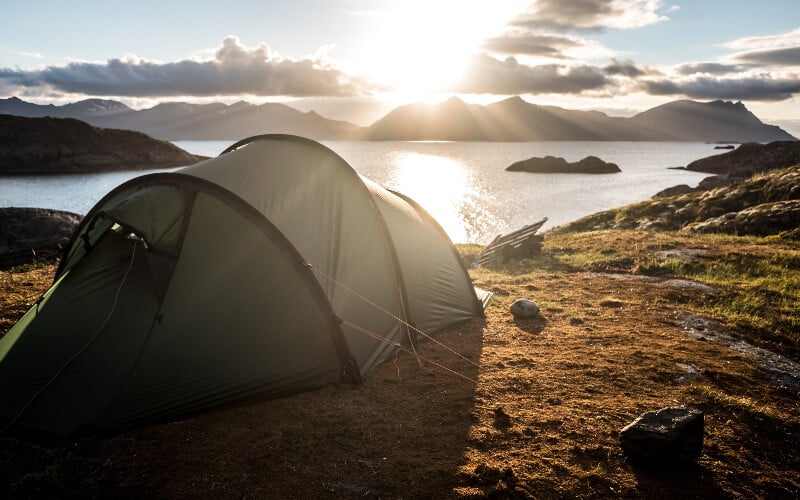
For starters, don’t set up camp right next to a river, stream, or body of water. Many creatures will likely draw from that water source, so you’re putting yourself right in their path-this includes creatures such as bears, mountain lions, raccoons, rodents, snakes, and insects. Water is great to have nearby, but you should plan on setting up camp at least 200 feet away.
Avoid Lush & Damp Areas
Also avoid areas that are damp or are overgrown grass if you’re wondering how to keep animals out of your campsite. Snakes love damp areas and tall grass, as do insects and bears.
Don’t set up camp right next to piles of rocks for fallen trees-many snakes and insects make their homes in these environments, so it’s a good idea to stay far away.
Find Flat Open Land
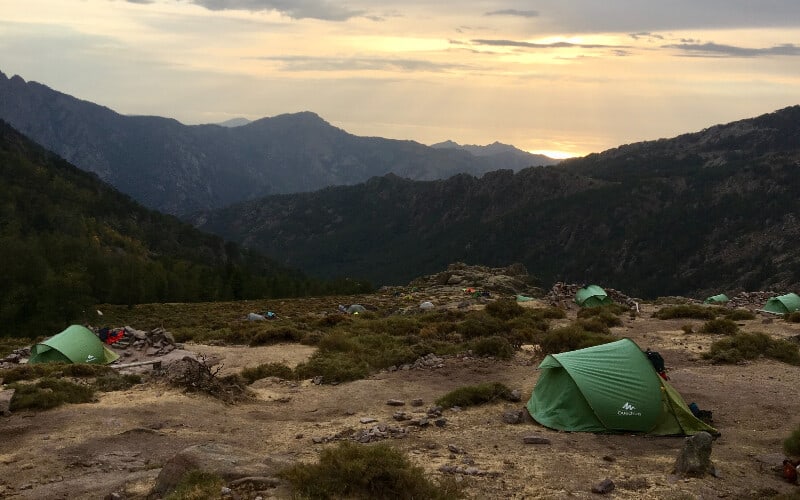
Ideally, you should set up camp on flat ground with minimal vegetation nearby. Less greenery means less bugs, snakes, and critters. Just make sure not to set up camp in a low spot, or else you may find your partially submerged in the event of rain.
Try to find a clearing where there are trees one hundred or so yards away so you can hang your far enough away to prevent attracting animals.
For more tips on choosing the ideal spot for your , see the intro of our Ultimate Beginner’s Guide to .
The Biggest Attractor:
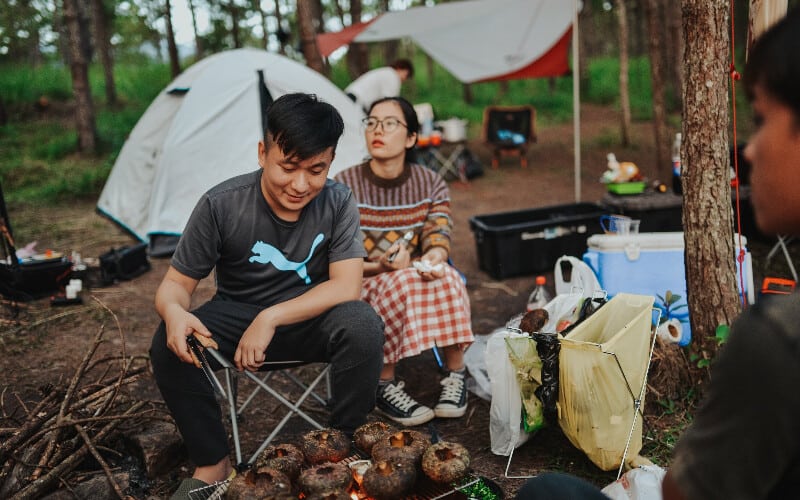
The scent of will draw the attention of animals far and wide if you aren’t careful. If animals can’t your , they’re much less likely to be interested in rummaging around. Some animals can up to 20 miles away.
Be sure to cook in different clothes (and don’t craw into your in the same clothes you cooked in). If possible, store your cooking clothes in or containers, and consider keeping these clothes with your far away from camp.
-Proof Containers
-proof containers are one of the best investments you can make if you plan on spending a lot of time outdoors. Most containers you have around your home are likely not designed with animals in mind. You want containers that are air-tight to ensure no tempting odors waft out and attract the attention of nearby critters.
In addition to being air-tight, these containers are more heavy duty-rats, raccoons, and other creatures can easily chew through plastic, so you want storage that offers more protection. There are also containers that are built to withstand bears and large cats and canines. A quality won’t be cheap, but they’re worth investing in if you live in, or plan on in, areas where these animals roam.
Where to Store
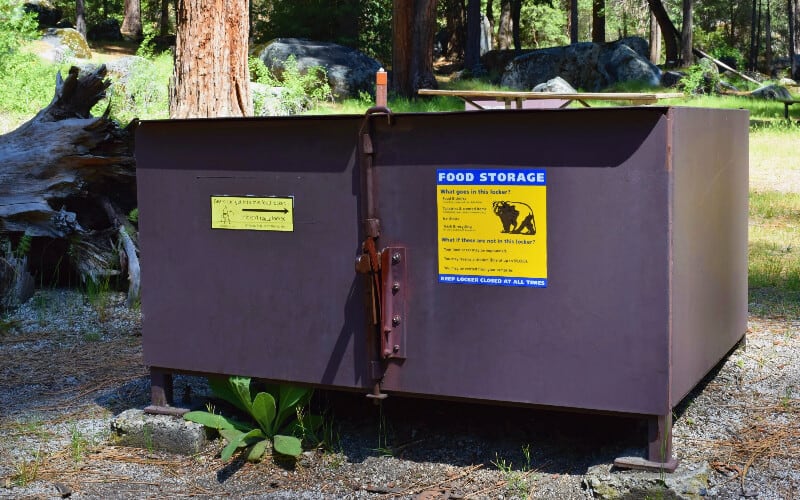
Even with the proper containers it’s a good idea to keep your at least 100 yards (or 300 feet) from your . It might seem like overkill, but if a realizes there’s around, you’d be in a much better position if it wasn’t close to your gear.
If your campground provides access to bearproof storage containers, be sure to take advantage of them. Otherwise, hanging your can add another layer of protection against animals. Suspending a (or a , though many believe bags are less effective) from a branch at least 20 feet off the ground, and at least 10 feet away from the trunk of the tree can help keep your safe from bears, raccoons, skunks, and other critters. Just be sure to choose a tree at least 100 yards away from camp.
Cleaning Your Dishes
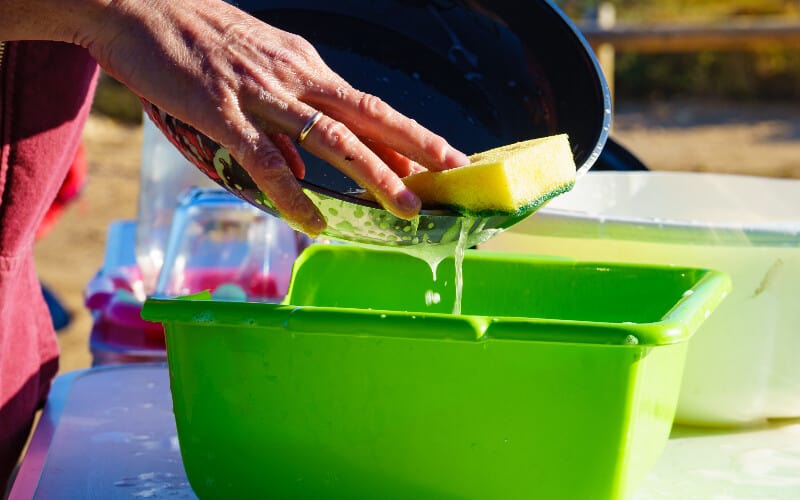
Be sure to wash your cooking equipment and dishes before and after use. Animals are attracted to crumbs, and if they any on your dishes or gear they’re likely to enjoy an easy meal-while leaving behind germs and feces that can cause illnesses. Remember: You can never over-clean your cooking and eating gear.
Many campgrounds provide communal kitchen sink areas where you can wash your dishes. If you have this option, be sure to take advantage as soon as you’ve finished eating.
If you don’t have the luxury of a communal sink, use your own kitchen sink to thoroughly clean your dishes. These “kitchen sinks” can be as simple as collapsible free-standing bags that take up little space when not in use but can hold a sufficient amount of water for cleaning up.
Before you wash your pots, pans, and dishes, remove crumbs by wiping down each item and disposing of the and cloths in the trash. Ideally, choose foods that don’t create a lot of crumbs or stick to your cooking equipment and dishes.
When you’re done washing your equipment, strain the crumbs as you dispose of the dirty dish water. Spread the wastewater out as thin as you can, so it can dry as quickly as possible-and choose a site far away from camp (at least 100 yards, but the further, the better).
If you have that you wish to store, secure it in a scent-proof container and keep it with the rest of your far away from camp (hung from a tree via or rope).
Storing & Disposing of Your
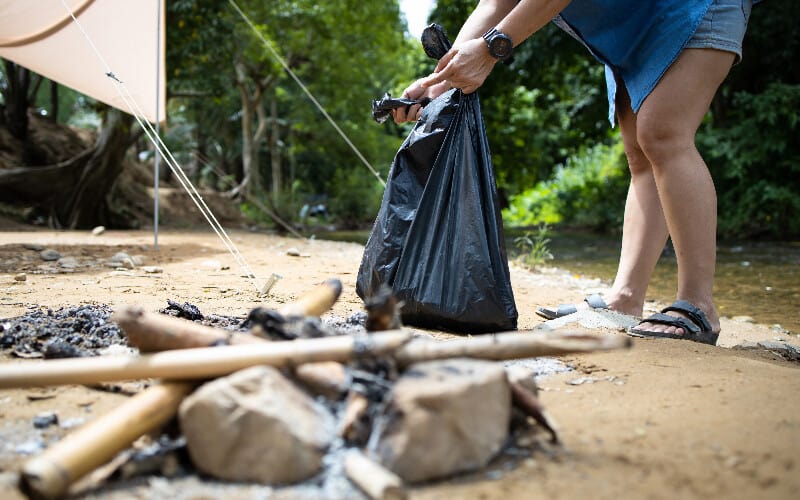
As you clean up after yourself, you’re going to generate . Many parks provide -proof dumpsters where you can dispose of a as you fill it. If you have this luxury, use these dumpsters frequently to dispose of waste as you create it.
If there are no dumpsters nearby, keep your trash together and store it far away from your , ideally next to your (hung from a tree). If you have an extra scent-proof container, store the trash in it if there’s enough space.
If you’re near your vehicle, you can also consider storing trash in your car until the trip is over-though you’ll want to make sure there’s no that can generate foul odors-the last thing you want to do is drive home in a cloud of stench! Similarly, if you’re in a you’ll have more options when it comes to storing a full of .
Whatever you do, don’t burn your in your fire. While it may be tempting, burning trash can release toxins into the ecosystem.
How to Keep Animals Out of Your Campsite with Scents
Remember: it’s okay to like the nature around you. If you’re in a wooded area, embrace the earthy smells you’ll naturally acquire during your trip-it will help you blend in and avoid unwanted attention.
In fact, bears and other animals can detect scented deodorant up to a mile away, so it’s important to use neutral-scented antiperspirant. Also avoid scented lotions and soaps for the same reason.
Different types of animals are repelled by different scents, but an old effective trick is to bring along a few boxes of on your trip. Most animals don’t like the scent, and you can scatter these throughout camp to create an effective barrier.
Scents to Keep Rodents Away from Your
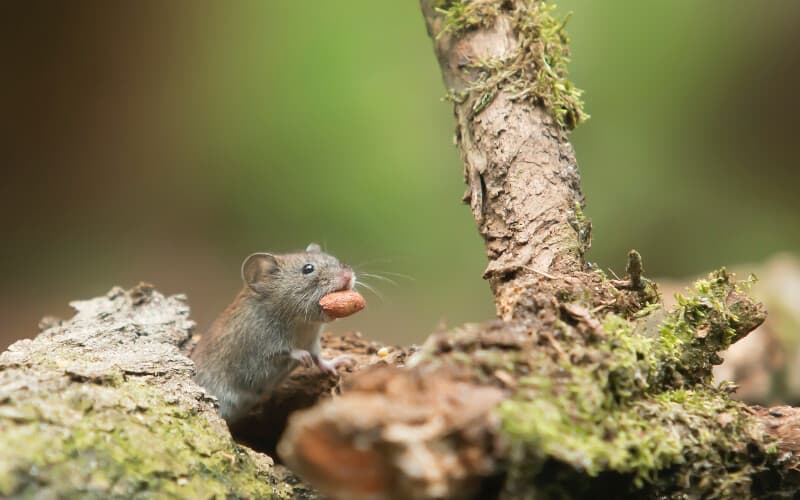
Here we’re using to refer to a wide range of animals-even though the nomenclature may not be 100% correct. In this case, “rodents” refers to rats and mice, squirrels and chipmunks, opossums and possums, raccoons, and any other small furry creatures that roam the woods. Keep in mind that a (or any ) can easily chew through fabrics and plastics, so it’s important to be prepared.
Pet Repellents
While pet repellants are often used to keep dogs and cats away from certain areas of homes, they can also work well when it comes to safely repelling unwelcome visitors. Any quality pet should have natural ingredients that won’t harm animals, but please be sure to double-check before you purchase any to use.
Sulfur
Sulfur is one of the oldest pesticides, and it works quite well for repelling unwanted rodents. It’s not foolproof and there’s not enough scientific evidence to say for certain how effective it is, but it is used in several deterrents. Simply sprinkle some powdered sulfur around your camp for a cheap and effective .
Ammonia
Ammonia is another great repellant-it’s a strong odor and can irritate animals’ nasal passages, and they’re likely to avoid areas that too strongly. Simply mix two parts ammonia to one part water (typically 2 cups of ammonia to 1 cup of water) and a few spoonfuls of natural detergent in bowls and scatter them around to help ward off rats and other critters.
White Vinegar
White vinegar has a strong, harsh that many animals don’t like. Similar to ammonia, simply fill up bowls with white vinegar and scatter them around the perimeter of your camp. Alternatively, you can soak or spray cloths and tie them up in strategic locations spaced out around the perimeter-just be sure to reapply the vinegar every few days.
Scents to Keep Wolves, Coyotes & Foxes Away from Your Campsite
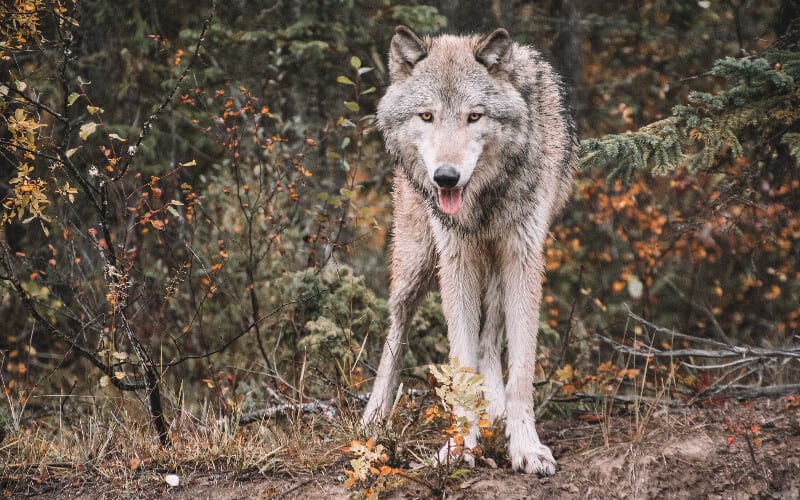
Wolves, coyotes, foxes, and other animals in the Canidae (dog-like carnivores) family are other types of animals that you want to keep at a distance. While these animals are bigger than rodents, they tend to be skittish and won’t usually pose much of a threat to humans compared to pumas and bears. That doesn’t mean they won’t intrude on your camp at night or while you’re away, though.
However, if you’re unlucky enough to find yourself surrounded by a pack of hungry wolves, you’ll want to know how to defend yourself-so be sure to read our How to Survive a Wolf Encounter article before sleeping where wolves roam.
White Vinegar
White vinegar is remarkably effective at keeping foxes away, though it has not been proven to ward off wolves or coyotes with the same efficacy. Its harsh should, in theory, help to ward off wolves and coyotes, but it’s not guaranteed (no deterrent methods are 100% effective). As with using vinegar to ward off rodents, you can soak or spray cloths and tie them up around your camp-just be sure to reapply the vinegar every few days-or you can fill bowls with the vinegar and scatter them around your camp’s perimeter.
Ammonia
As you’ll see, ammonia is one of the most versatile repellents around. Not only can it ward off rodents and the other creatures you’ll see listed below, but it can also be an effective deterrent against a or other canine. As with the white vinegar, the most effective ways to use ammonia are to either soak fabric in them and stake the fabric up around the , or to mix half water and half ammonia in a bowl, with some detergent added in if possible.
Scents to Keep Snakes Away from Your
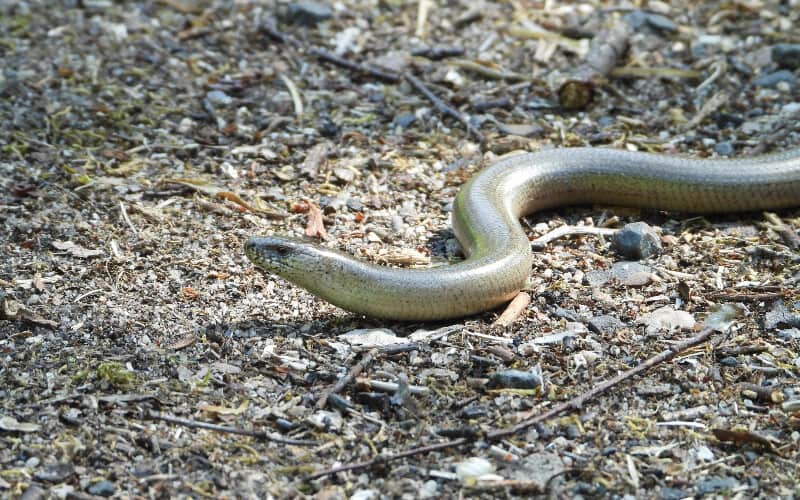
Snakes are less of a nuisance when it comes to raiding your camp for , but they can pose a threat to your safety. The many snakes aren’t venomous, and of those that are only a fraction are deadly to humans. However, bites don’t feel good-and there’s certainly a chance the is venomous, so it’s advantageous to do what you can to keep them away.
Repellents
There’s a lot of debate as to whether commercial repellents on the market actually work to keep snakes away. While it’s true that no is 100% effective, if you can find some in your budget it certainly wouldn’t hurt to use it as an extra layer of defense around the perimeter of your site and tents.
In addition to warding off rodents, sulfur can also be an effective deterrent for snakes. Just sprinkle some around to add more defense against any slithering visitors.
Similarly, snakes don’t like the odor of ammonia in the same way that rodents don’t. Instead of (or in addition to) scattering bowls, you can spray ammonia on cloths that you scatter around (tie the cloth to sticks and plant them in the ground). However, ammonia can kill grass and plant life, so be careful with it.
Cinnamon & Clove Oils
A 50/50 mix of cinnamon oil and clove oil has been proven to be highly effective at deterring snakes. It’s most effective when sprayed directly at/on approaching snakes, so it’s a good idea to keep a spray bottle on you or nearby if possible. You can also soak fabric in the mixture and leave it around your camp. Just remember to keep re-soaking the fabrics to maintain effectiveness.
Scents to Keep Mountain Lions Away from Your
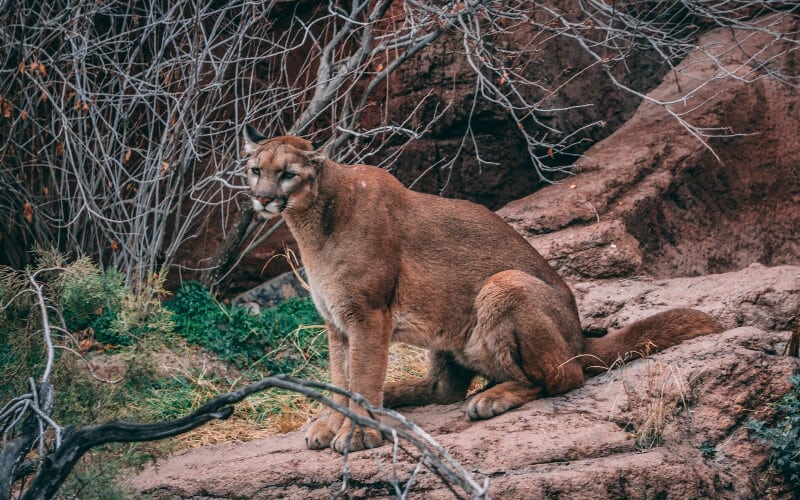
Mountain lions are a bit harder to deter than smaller rodents, but there are still some scents you can deploy to try and keep them at a distance. Please keep in mind that none of these methods are 100% effective, and you should read our article Surviving a Mountain Lion Encounter so you know what to do if find yourself face to face with a mountain lion.
If you’re in cougar country, it’s of utmost importance to keep your edibles securely locked up in -proof storage containers and keep your well away from where you’re sleeping, as scents alone won’t be enough to ward off an aggressive mountain lion if they’re looking for a fight.
Essential Oils
Cats of all sizes generally dislike the strong scents of oils. This has been proven with house cats, and the same theory applies to big wildcats. It’s not guaranteed to be a fully effective deterrent but tying strips of oil-soaked cloths to sticks stuck around the perimeter might help ward off any prowling felines.
Yet again, ammonia might save the day. In addition to being a solid deterrent for rodents and snakes, the strong of ammonia may be enough to help keep these big cats at bay. Never spray ammonia directly at a wild cat, as it can permanently damage their nose, making it much more difficult for them to catch prey and survive.
Urine
Some people believe that urine is a good deterrent for mountain lions, but most experts agree that urine is more likely to attract these animals than it is to scare them off-so it’s advised not to pee too close by.
Scents to Keep Bears Away from Your
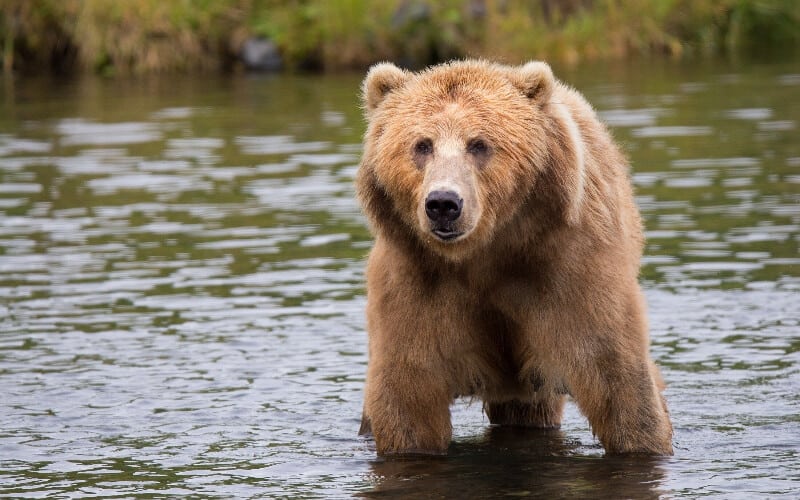
Bears are another potentially dangerous woodland creature that may stumble upon your camp if you’re going to be exploring . As with mountain lions, your best line of defense is keeping your properly sealed in a to prevent odors from leaking out and storing it far away from camp so you don’t draw attention.
As with deterring mountain lions, keep in mind that none of these methods are 100% effective, and you should read our article Surviving a Encounter so you know what to do if find yourself face to face with a .
Pine Oil
Bears don’t like the scent of pine, so a bottle of Pine-Sol or any other cleaner that contains pine can be fantastic for keeping bears away from your camp. Fill a spray bottle with one part pine cleaner and one part water and spray it on fabric that you scatter around your perimeter. Be sure to re-spray often to keep the scent strong for maximum effectiveness.
Also spray around your , and around any or trash containers as well.
Ammonia
Yet again, ammonia comes in handy as a deterrent. Bears (like most other creatures) really don’t like the scent of ammonia. Like pine oil, you can soak or spray pieces of fabric around your with ammonia in an attempt to deter bears and other critters.
Never spray ammonia directly at a , as it can permanently damage their nose, making it much more difficult for them to catch prey and survive.
isn’t effective as a deterrent when sprayed around your camp, but it’s very handy to have if you’re in in case a is imminent. These sprays can be effective against a , brown , or even polar , but be sure to check the survival guide linked above in order better understand and to be properly prepared in case of an encounter.
Using Technology to Keep Animals Away
Properly storing far away and reinforcing your perimeters can help reduce the odds of encountering unwelcome visitors, but you can also utilize technology if you want to add more layers of defense.
Unwelcome Mats
Unwelcome mats can range from low cost and low-tech to expensive and high-tech, depending on what your budget allows. The simplest unwelcome mats are simply boards (such as plywood) with nails hammered through to stick upwards, creating a painful barrier should any bears or big animals try to walk on them. More sophisticated mats have no nails, but instead send a powerful (though not lethal) electric jolt when stepped on.
Just be sure that everyone in your party is aware of exactly where these unwelcome mats are so that there are no accidents if someone gets up in the middle of the night. If you’re in popular spot, be sure to clear your use of these with local authorities such as park rangers to ensure you don’t get in trouble.
Solar-Powered LED Lights
Companies sell solar-powered red flashing LED lights that come in pairs and look a lot like an unknown creature blinking in the dark, which triggers animals’ fight-or-flight instincts and keeps them at bay. These are used by farmers all over the world to protect their crops and animals by keeping wolves, leopards, and bears away—and you can use a similar technology if you’re looking for how to keep animals away from your campsite.
If you decide to utilize these lights, make sure you have several sets so that you can face them outward in different directions around your camp for better coverage and protection.
Frequently Asked Questions
Does Noise Keep Animals Away?

Many campers wonder if making noise can help scare beasts off, or if noise acts as an attractant. The fact of the matter is that noise alone will not keep animals away. If anything, it can act as an attractant to curious critters who want to check out the source of the sound.
However, if an perceives a threat along with the noise (i.e. multiple people around, clanking, banging, etc.) they are more likely to steer clear, so being loud can be advantageous if you’re in a group.
There are plenty of noisemakers on the market that claim to be effective-these gadgets range from machines that constantly generate sounds to cartridges that can be fired off to scare animals, air horns, and more. These noisemakers are generally frowned upon if you’re in a popular spot with other campers nearby.
There are some sound generators that create high-pitched frequencies that are inaudible to humans, but very clearly heard by local . These are great for short-term trips, but if you’re going to be at the same spot for multiple days the sound will lose its efficacy. When animals realize the sound isn’t associated with any negative consequences, it will no longer ward them off.
Will a Campfire Repel Animals?
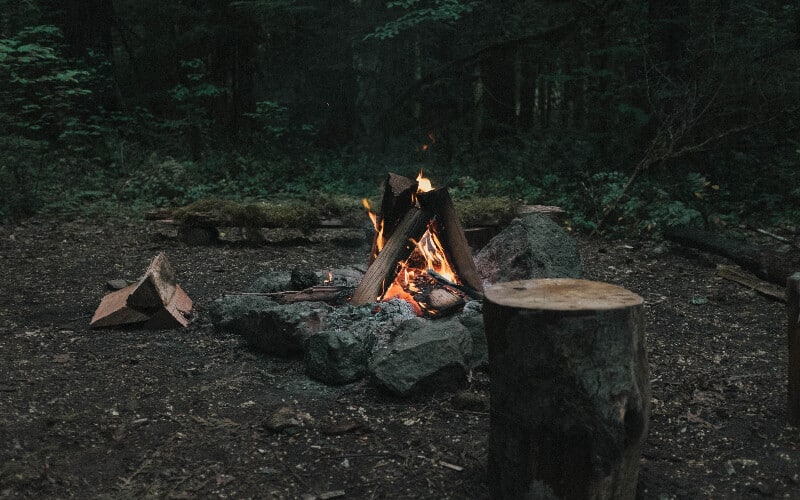
While a campfire will make your presence known, most animals have an instinctual fear of fire, which should keep them at bay. However, this is not a guarantee—a or other hungry or desperate enough may still enter.
Unfortunately, it’s not safe to leave a fire burning when you’re going to be exploring or when you’re all asleep (both of which are prime opportunities for critters to infiltrate your camp). If possible, have at least one person stay with the fire at all times, and consider taking shifts to monitor and keep the fire going overnight.
Read here for more tips on how to build the perfect campfire every time.
Are Effective?
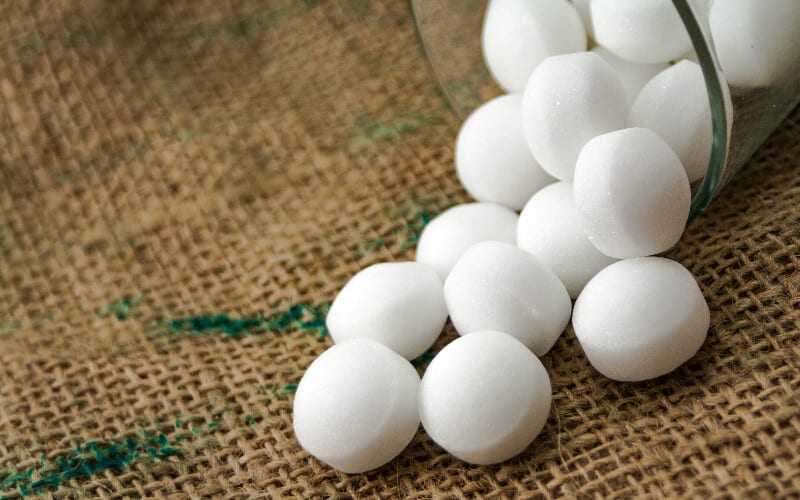
These insecticides are often mentioned when discussing how to keep animals away from your campsite, but are they really effective? The short answer is: not really. These balls of chemicals do very little outside of their intended purpose (killing moths and moth larvae), but can be very dangerous for the environment. In fact, using these for any other purpose than what it says on the package (killing moths in air-tight containers) is actually illegal. Instead of risking harming the nature around you and breaking the law, stick to the other more effective and less harmful techniques discussed here.
What are the Best Ways to Repel Mosquitos and Insects?
Animals may threaten your and bigger beasts can physically harm you, but bugs are a whole different battle. Not only will some insects swarm your supply if given the chance, but many can bite you or sting you, causing itchiness, pain, discomfort, and even illness or allergic reactions. The last thing you want is a to be ruined by a pesky !
It’s important be prepared to combat bugs on your trips (a single can carry any number of diseases), so we put together a whole article you can reference before your next outing: How to Repel Mosquitos & Insects. There we look at all kinds of solutions, from sprays and scents (does a actually work?) to , and everything in between.
How to Keep Animals Away from Your Campsite: Wrap-Up
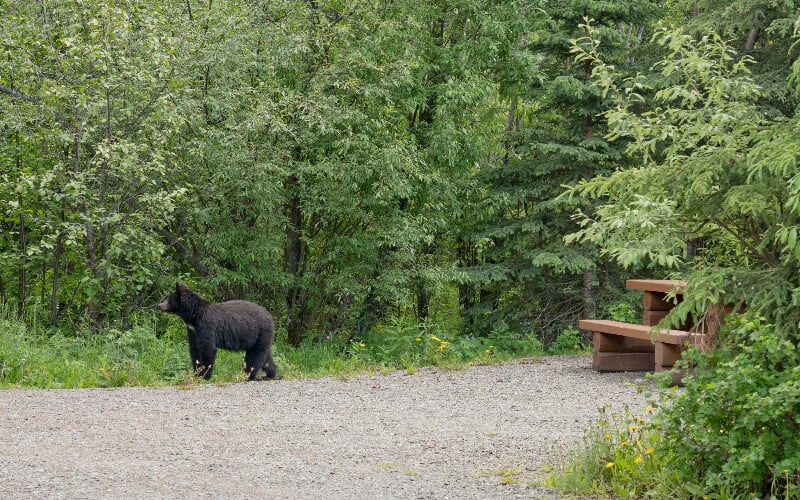
Remember, there’s no 100% effective way to keep away, but if you follow the advise above you’ll significantly reduce your chances of having your camp ransacked by curious creatures. Take a few minutes to find the right ground to build your , store your properly, and clean up after yourself and you’ll be in great shape.
Add extra layers of defense by using the right scents, and avoiding using scented deodorants and lotions. If you’re in areas where larger predators may roam, you may want to use some extra technology to help further secure your -and be sure to read up on our encounter survival guides (linked above) to ensure you’re prepared for any situations that may arise.

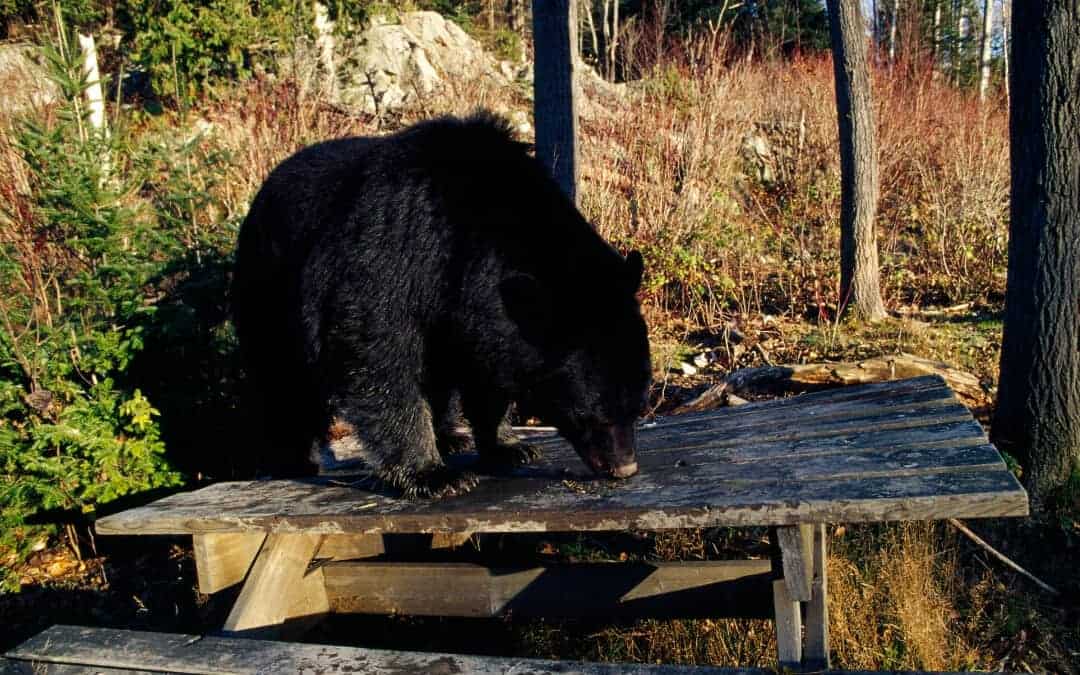
0 Comments